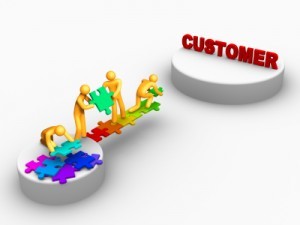 Mistakes are a part of life, but we can benefit from our mistakes and make the most of them, or we can run from them pretending they never happened.
Mistakes are a part of life, but we can benefit from our mistakes and make the most of them, or we can run from them pretending they never happened.
Forbes published an article on how the smartest people convert mistakes and obstacles into opportunities.
The author, Paul Brown, said, “People who succeed at work and in life treat everything they encounter – even if it is what you and I would call a mistake or a problem – as an opportunity.”
He offered three reasons for thinking this way:
You are going to find out eventually what people liked about your idea, and what they didn’t like. It’s better to learn sooner rather than later the good and bad about your product, before you sink any more money and/or resources into the idea.
The feedback and market reaction could take you in a different direction or it could serve as a barrier to your competitors. Brown provides the example of an entrepreneur thinking of opening a restaurant, but a survey told him potential customers thought the area was already saturated. However, a few of said they would love a place that had a ready-to-go take out to heat up at home. Since the entrepreneur was able to get feedback before opening the restaurant, he was able to avoid a mistake.
The feedback you receive provides you with evidence to get you ahead of the game. If someone else is thinking about doing something, such as opening a restaurant, you know something they don’t.
For instance, take a look at Coca-Cola.
Pharmacist John Pemberton was trying to come up with a headache cure and general pain reliever. He began work on beverage combining coca leaves and cola nuts, but when his lab assistant accidentally mixed the concoction with carbonated water; the two men tasted it, liked it, and decided they might make a profit on it. They invented the beverage that became known to the world as Coca-Cola in a backyard kettle. In other words, they turned their mistake into a profitable opportunity.
Another example is when Chrysler rebranded the Sebring as the Chrysler 200.
Chrysler was considered the U.S. automobile company most likely to collapse. They remained silent while Ford and GM tried to restore their images. They knew their ad needed to be different; something special that would make customers believe in Chrysler again and show they had a new and improved product. They delivered in the 2011 Super Bowl ad. They offered something gritty, dark, and full of attitude. The ad is as much about Detroit as it is about the Chrysler 200. Their “Imported from Detroit” slogan resonated with an American audience who understood the trials of economic hardships. The ad gave people hope and Chrysler made the most of it. Chrysler saw some of its best sales months in 2011 since 2007.
We all make mistakes, but to move forward, we must learn from them. Take a page from the playbooks of Coca-Cola and Chrysler, and turn your mistakes into opportunities.
What’s the worst mistake you’ve made? Did you turn it into an opportunity?
image: plindberg
 We are all human; we all err. No one is exempt. As a leader, you’ll be more remembered for how you deal with your mistakes, than your actual mistake. Think about that.
We are all human; we all err. No one is exempt. As a leader, you’ll be more remembered for how you deal with your mistakes, than your actual mistake. Think about that.
Some of the greatest mistakes in business are more remembered for how they were handled. Think about Johnson and Johnson’s handling of the Tylenol situation, which was seen as positive despite the tragic situation. On the other hand, there is the BP oil spill which became a disaster for all involved because of the CEO’s poor handling of the situation.
In other words, you can make it worse, or you can make it better. It’s all in how you handle the aftermath of said mistake.
Art Petty shares tips to deal with your mistakes providing a great reminder on a number of levels. Most of all, he advises, rightly so, how you handle your mistakes is a great sign of your leadership abilities.
Maybe you’ll stop making mistakes? Don’t count on it. If we are afraid to make mistakes, it means we aren’t taking risks. The best outcomes happen after leaders accept responsibility, apologize, and outline how they will fix the problem.
Have you made a mistake recently? Do you want to practice here and tell us about it?
 Businesses get so caught up in the relentless pursuit of new customers, they often forget about the customers they already have. It’s a costly mistake, since by some estimates, acquiring new customers costs five to 10 times as much as keeping loyal customers. And no business survives long using that arithmetic.
Businesses get so caught up in the relentless pursuit of new customers, they often forget about the customers they already have. It’s a costly mistake, since by some estimates, acquiring new customers costs five to 10 times as much as keeping loyal customers. And no business survives long using that arithmetic.
Jason Brick, a contributor to Open Forum, warns “preventable losses” are the most damaging to small businesses.
He shares some tips about common mistakes all businesses make—and how you can avoid losing a customer.
“Sharing customer information can represent a new income stream for your business,” Brick concedes, but at what cost? When customers purchase your product or service, they are willing to share personal data with you. They trust you to be responsible caretakers of that data. Once trust is broken, you’ve lost a customer.
Politics and religion are hot-button topics under the best of circumstances, so there’s no good reason to unleash these “conversational time bombs” within the confines of your business.
“If a client brings the topic up, it’s best to be noncommittal while listening politely,” says Brick. Good advice!
Some businesses will go to great lengths to avoid owning up to their mistakes. Some even cast blame on their customers (“used our product incorrectly,” etc.).
Even if the issue is the customer’s fault, the wisest approach is to offer a sincere apology. As Brick notes, “The price of replacing a purchase or giving away a few hours of service is nothing compared to the future value of that customer.”
Amazon offers suggestions based on the products a customer buys, so why can’t you? “Firing off a set of suggestions without regard for who you’re asking shows you don’t value the customer as an individual,” Brick says.
On the other hand, if you take time to make suggestions based on a specific customer analysis, you may be providing genuine value to your customers. One-size-fits-all doesn’t work here.
Rudeness to customers takes many forms: inattention, loss of temper, acting bored or arrogant. It can happen to the best of us, but if it occurs in the course of a customer encounter, you will likely never see that customer again.
“Train your employees—and yourself—to leave those behaviors behind when they come to work,” Brick says. “Nothing you wouldn’t say or do to your favorite grandmother has a place when working with customers.”
Time and again, it’s the little things that count. How much effort does it take to acknowledge customers you’ve served before? Some small notice of their repeat business helps keep them loyal. As Brick suggests, “A ‘how did you like that shirt you bought last week?’ can go a long way."
Take a few minutes to remind your team of the value of honoring loyal customers who continue to purchase your products or services.
What are your own customer-retention best practices?
 Emotional intelligence—“the ability to monitor one’s own and others’ feelings and emotions and use this information to guide one’s thinking and actions”—could be a great resource for your sales team. If they lack emotional intelligence, your salespeople might make errors that cost you sales.
Emotional intelligence—“the ability to monitor one’s own and others’ feelings and emotions and use this information to guide one’s thinking and actions”—could be a great resource for your sales team. If they lack emotional intelligence, your salespeople might make errors that cost you sales.
So says Bruna Martinuzzi, the founder of Clarion Enterprises Ltd, and a contributor to OPENForum.
She lists six key mistakes she’s seen, with advice on how to avoid them.
We buy from people we like—not a news flash, right?
But too many salespeople focus on closing a sale, rather than on forging a relationship with prospective clients. The ability to connect and create long-lasting relationships is at the core of emotional intelligence. A salesperson who enters the relationship “with the mindset of doing service” will more often make that all-important emotional connection.
According to Martinuzzi, doing service means “going out of our way to match a customer’s needs, making ourselves available … and taking personal responsibility for anything that happens, especially after the sale has been made.”
Salespeople are often trained to speak over a potential customer’s objections, to get the sales pitch in before anything else happens. Put yourself in the customer’s shoes—do you think you’d like to be subjected to this approach?
Instead, Martinuzzi says, be aware of the affect your pitch has: “Watch for body language cues that signal when they've had enough.”
Emotional intelligence means you can ask prospects these key questions, and listen to the answers:
One more tip: Take notes while you listen. Don’t rely on memory or you’ll be sure to forget something.
Each salesperson has a unique style, but if they’re unaware of it, they can’t gauge the affect they have.
Researchers writing in the Harvard Business Review identify several types of behavior that work against closing a sale:
Your salespeople need to know their sales style so they understand what’s effective, and what works against them.
A salesperson with a high emotional intelligence IQ can adapt to unforeseen situations, and is open to new ways of doing things.
“When we use scripted sales pitches, we lose some of our authenticity,” Martinuzzi says.
Potential clients are generally alert to any false notes or insincere language in their dealings with salespeople. The most effective approach is to learn everything you can about the client before you meet with them, then “forget the script and speak from the heart about what you do and what you can offer.”
Emotional intelligence means genuine wins over faking it every time.
A salesperson who acts as if he has all the answers and nothing to learn from the potential client’s own experience is failing to make an emotional connection.
As Martinuzzi puts it, “Wanting to be the smartest person in the room rarely works.”
Successful sales happen when you connect with what matters to people. And what matters to people are emotions.
What sales mistakes have you seen or experienced, as they relate to lack of emotional intelligence?
[mc4wp_form]
